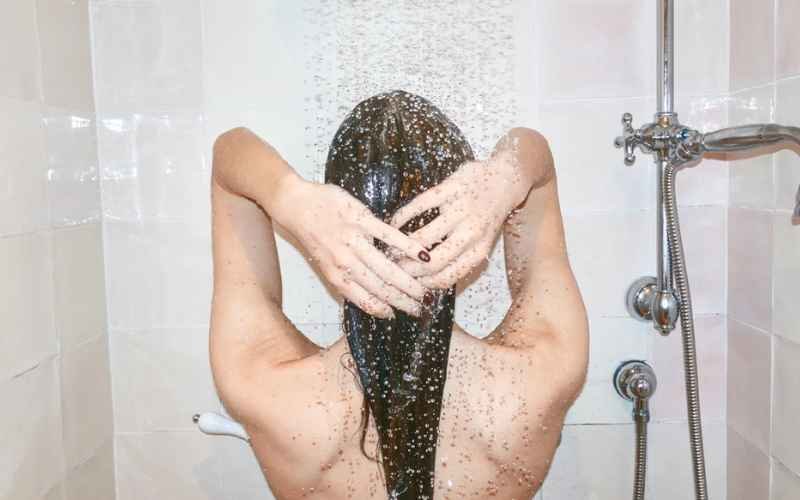Summer is a season of sweltering heat and rising temperatures, often leading us to seek solace in the refreshing embrace of water. While a cold shower is typically preferred to cool down, some people might opt for a hot bath, either out of habit or for the perceived therapeutic benefits. However, bathing in boiling tap water during the summer can have detrimental effects on both your skin and hair. Here’s why you should think twice before turning up the heat.

1. Stripping Natural Oils
Skin:
Your skin has a natural barrier made up of oils and lipids that keep it hydrated and protected. When you bathe in hot water, these oils are stripped away, leaving your skin dry and unprotected. This can exacerbate conditions such as eczema and psoriasis, making your skin itchy, flaky, and irritated.
Hair:
Similar to your skin, your scalp produces natural oils (sebum) that are essential for healthy hair. Hot water can strip these oils away, leading to a dry, itchy scalp and brittle hair. This can result in increased hair breakage and split ends.
2. Heat Damage
Skin:
Prolonged exposure to hot water can cause damage to the outer layer of your skin (epidermis). This can lead to redness, inflammation, and even burns in severe cases. Your skin’s ability to retain moisture is compromised, leading to a condition known as transepidermal water loss (TEWL).
Hair:
Hot water can weaken your hair strands, making them more susceptible to damage. The heat opens up the hair cuticles, which can cause the hair to lose moisture and become frizzy. If you regularly wash your hair with hot water, it can lead to long-term damage, making your hair dull and lifeless.
3. Aggravating Sunburn
If you’ve spent time in the sun and have developed a sunburn, hot water is the last thing your skin needs. Hot water can further irritate sunburned skin, causing more pain and prolonging the healing process. It can also increase the risk of peeling and blistering.
4. Disruption of Skin pH Balance
Your skin has a natural pH level that is slightly acidic, which helps protect against harmful bacteria and fungi. Hot water can disrupt this balance, leading to an overgrowth of harmful microorganisms and increasing the risk of infections and acne breakouts.
5. Fading Hair Color
For those who color their hair, hot water can accelerate the fading process. The heat opens up the hair cuticles, allowing color molecules to escape more easily. This means that your vibrant hair color will lose its luster more quickly if you regularly wash with hot water.
Tips for Protecting Your Skin and Hair
- Opt for Lukewarm Water: Choose lukewarm water instead of hot water to preserve your skin and hair’s natural oils and moisture.
- Limit Shower Time: Keep your showers short to minimize the exposure to water, which can strip away natural oils.
- Moisturize Immediately: Apply moisturizer to your skin immediately after showering to lock in moisture. Use a leave-in conditioner for your hair to keep it hydrated.
- Use Gentle Products: Choose gentle, hydrating cleansers and shampoos that do not contain harsh chemicals that can further dry out your skin and hair.
- Stay Hydrated: Drink plenty of water throughout the day to keep your skin and hair hydrated from the inside out.
Conclusion
While a hot bath may feel relaxing, especially after a long day, it’s important to be mindful of the temperature and duration, especially during the summer months. Opting for cooler showers and following a proper skincare and haircare routine can help maintain the health and vitality of your skin and hair. Remember, taking small steps to adjust your bathing habits can prevent long-term damage and keep you looking and feeling your best all summer long.
Top 20 FAQs about Bathing in Boiling Tap Water During Summer: Know How It Can Damage Your Skin and Hair
1. Can hot water really damage my skin and hair?
Yes, hot water can strip natural oils from your skin and hair, leading to dryness, irritation, and damage.
2. Why is hot water worse for skin in summer?
In summer, your skin is already exposed to harsh sun and heat, making it more susceptible to damage from hot water.
3. What are the signs that my skin is damaged from hot water?
Dryness, redness, itchiness, and flakiness are common signs of skin damage from hot water.
4. How does hot water affect hair health?
Hot water can strip the scalp of natural oils, causing dryness, breakage, and frizziness.
5. Is it true that hot water can worsen sunburn?
Yes, hot water can further irritate sunburned skin, causing more pain and delaying healing.
6. Does hot water impact the pH balance of the skin?
Yes, hot water can disrupt the skin’s natural pH balance, increasing the risk of infections and acne.
7. Can hot water fade hair color?
Yes, hot water opens the hair cuticles, allowing color to fade more quickly.
8. Are there any benefits to using hot water for bathing?
While hot water can relax muscles and improve circulation, it’s best to use lukewarm water to avoid skin and hair damage.
9. How can I protect my skin if I prefer hot showers?
Limit your shower time, use lukewarm water, and moisturize immediately after showering.
10. What temperature is considered ‘boiling’ tap water?
Boiling water is typically 100°C (212°F), but tap water should not reach this temperature. Hot tap water above 40°C (104°F) can still cause damage.
11. Can hot water cause long-term damage to my hair?
Yes, prolonged use of hot water can lead to brittle, lifeless hair and increased hair loss over time.
12. What are the best practices for washing hair to prevent damage?
Use lukewarm water, gentle shampoos, and conditioners, and avoid excessive washing.
13. How often should I bathe to avoid skin and hair damage?
Bathing once a day is sufficient; over-bathing can strip natural oils from the skin and hair.
14. Are there specific products that help counteract hot water damage?
Look for hydrating cleansers, moisturizers, and leave-in conditioners designed to replenish moisture.
15. Can children and infants be affected by hot water in the same way?
Yes, children’s skin is more sensitive, so always use lukewarm water for their baths.
16. Is there a way to measure the water temperature accurately?
Use a bath thermometer to ensure the water temperature is safe and comfortable.
17. Does hot water affect all skin types equally?
People with sensitive, dry, or eczema-prone skin are more likely to be affected by hot water.
18. Can I alternate between hot and cold water for bathing?
Yes, alternating can help improve circulation, but ensure the hot water is not too hot and the cold water not too cold.
19. Is it better to air dry or towel dry after a shower?
Gently patting your skin with a towel is better than vigorous rubbing, which can cause irritation.
20. What are some natural remedies to soothe skin damaged by hot water?
Aloe vera, coconut oil, and oatmeal baths can help soothe and heal damaged skin.









